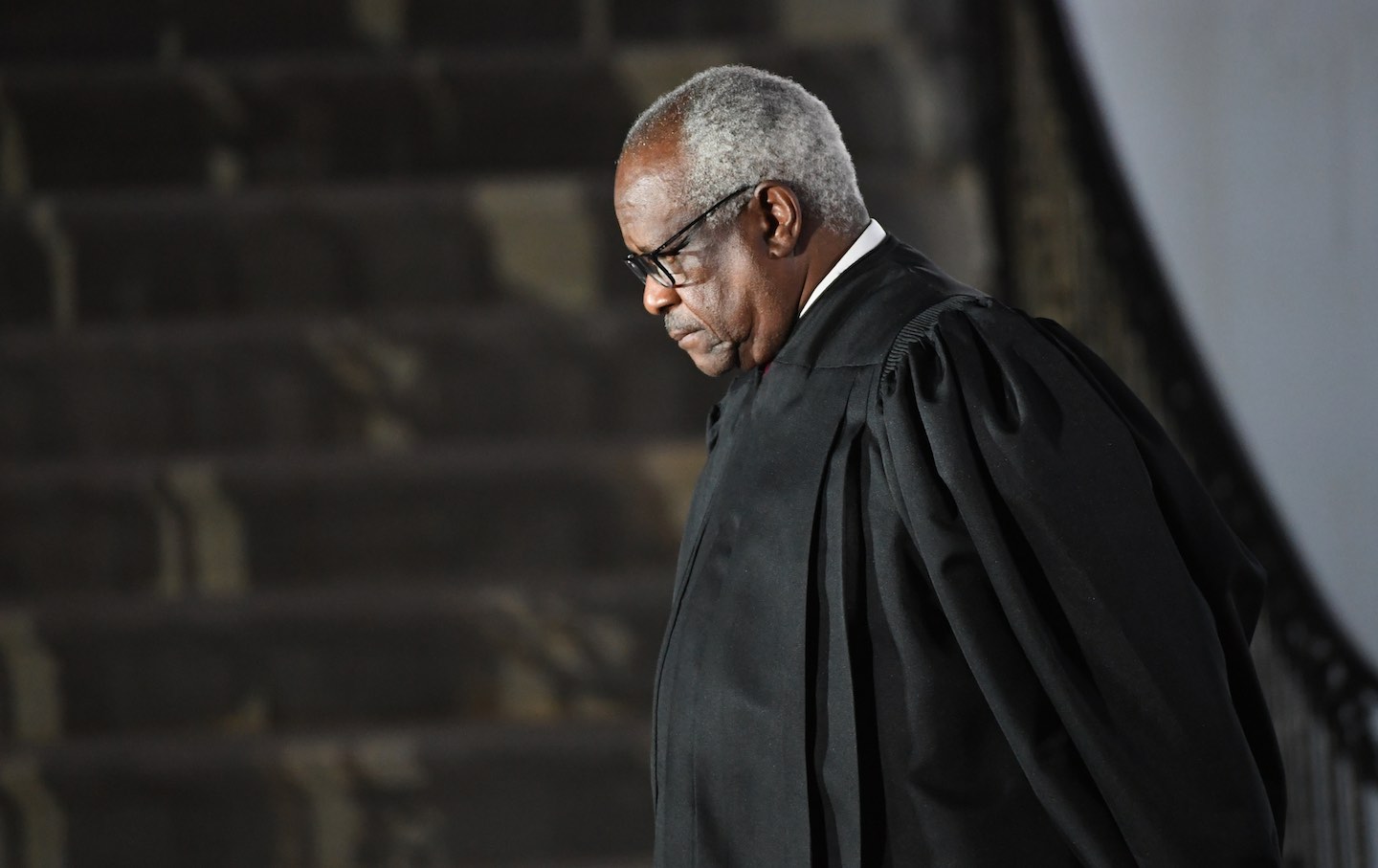On this episode of the Contempt of Court podcast, Congressman Hank Johnson and writer Emily Bazelon discuss fixes to the Court's ethics problem.

Justice Clarence Thomas.(Photo by Jonathan Newton / The Washington Post via Getty Images)
Here's where to find podcasts from The Nation. Political talk without the boring parts, featuring the writers, activists and artists who shape the news, from a progressive perspective.
The Supreme Court has a serious ethics problem—actually, ethics problems. The justices have been dogged by allegations of corruption. They’ve been peppered with questions about how they make money. And then, of course, there’s the long career of Clarence Thomas, who, along with his wife Ginni Thomas, appears so brazenly corrupt that his scandalous behavior has made the very idea of Supreme Court ethics seen like a complete joke.
I have long argued that Supreme Court ethics reform is as critical to fixing the Supreme Court as any of the more structural changes that reformers want to make—like increasing the number of justices or decreasing the length of time those justices serve.
On this episode of Contempt of Court, we’re going to talk about what can be done to stop these people from wallowing in the slop of their own graft. First up, we talk to New York Times Magazine writer and Yale Law professor, Emily Bazelon about what corruption looks like when it comes in the form of a Supreme Court justice. Then, we talk to Georgia Congressman Hank Johnson, who is one of the few lawmakers who is doing something about it.
Advertising Inquiries: https://redcircle.com/brands
Privacy & Opt-Out: https://redcircle.com/privacy
The Supreme Court has a serious ethics problem—actually, ethics problems. The justices have been dogged by allegations of corruption. They’ve been peppered with questions about how they make money. And then, of course, there’s the long career of Clarence Thomas, who, along with his wife Ginni Thomas, appears so brazenly corrupt that his scandalous behavior has made the very idea of Supreme Court ethics seen like a complete joke.
I have long argued that Supreme Court ethics reform is as critical to fixing the Supreme Court as any of the more structural changes that reformers want to make—like increasing the number of justices or decreasing the length of time those justices serve.
On this episode of Contempt of Court, we’re going to talk about what can be done to stop these people from wallowing in the slop of their own graft. First up, we talk to New York Times Magazine writer and Yale Law professor, Emily Bazelon about what corruption looks like when it comes in the form of a Supreme Court justice. Then, we talk to Georgia Congressman Hank Johnson, who is one of the few lawmakers who is doing something about it.
Here's where to find podcasts from The Nation. Political talk without the boring parts, featuring the writers, activists and artists who shape the news, from a progressive perspective.
This is the eighth and final episode of Contempt of Court, our podcast series about reforming the Supreme Court. On this episode, we’re going to talk about the court’s only true form of power: legitimacy.
To discuss potential paths toward delegitimizing the Court, my first guest on this episode is Harvard Law School professor, Nikolas Bowie. He makes a compelling case that the people, through their representatives, should be the ones in charge, not the Supreme Court.
Afterward, Rhiannon Hamam, host of the fantastic Supreme Court podcast 5-4, has some thoughts on what’s happening on the ground, as people try to take back power from the Court through direct action.
Advertising Inquiries: https://redcircle.com/brands
Privacy & Opt-Out: https://redcircle.com/privacy
Elie MystalTwitterElie Mystal is The Nation’s justice correspondent and a columnist. He is also an Alfred Knobler Fellow at the Type Media Center. His first book is the New York Times bestseller Allow Me to Retort: A Black Guy’s Guide to the Constitution, published by The New Press. You can subscribe to his Nation newsletter “Elie v. U.S.” here.